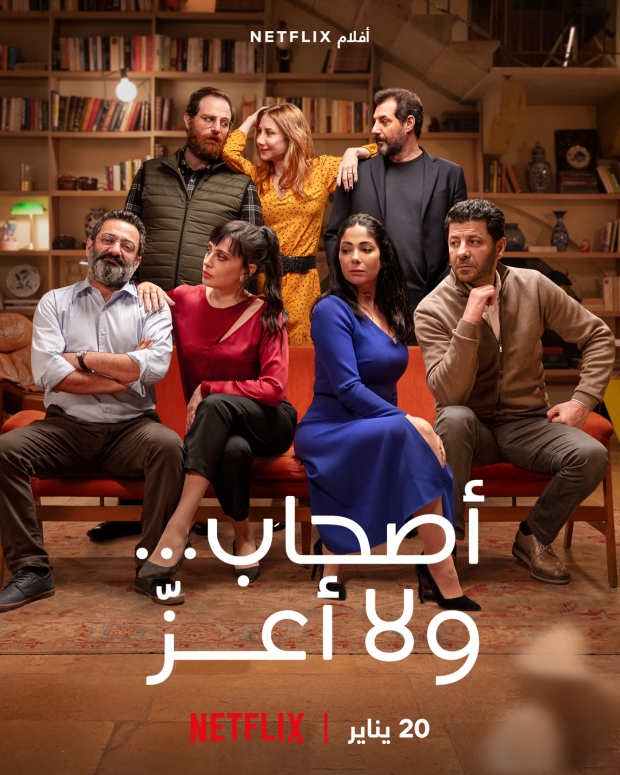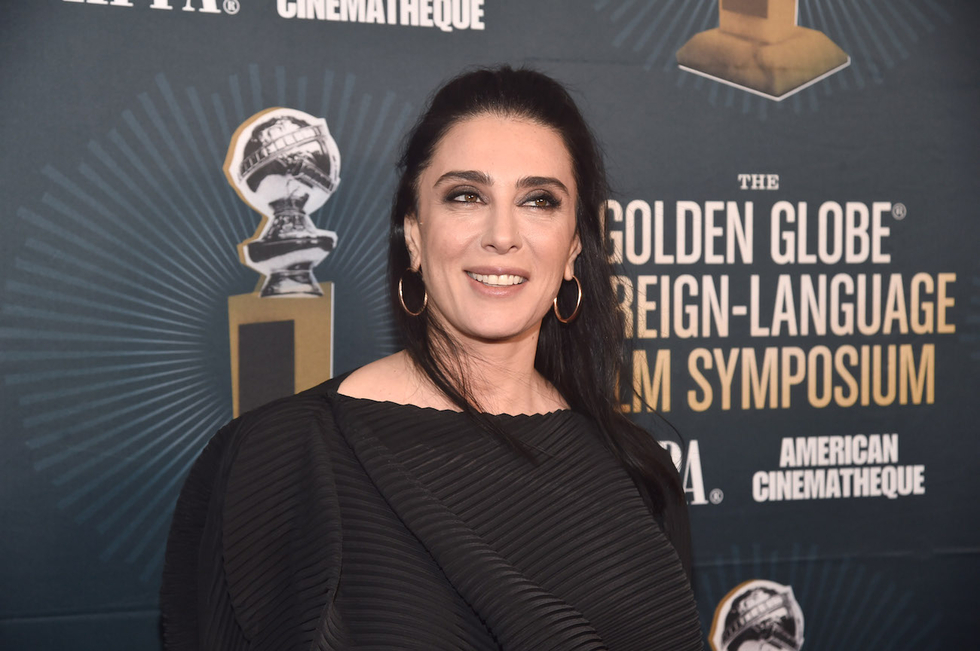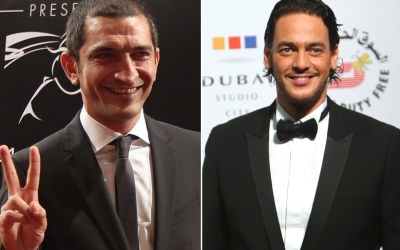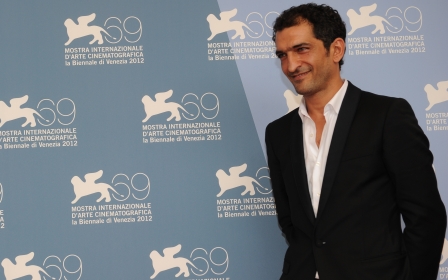Netflix's Perfect Strangers: Plenty of controversy, potent politics and little art

Editor’s note: This review contains spoilers
It was supposed to be the safest of bets. A remake of one of the most successful European films of recent years fronted by some of the Arab world’s most popular stars.
It was Netflix’s first foray into Arabic-language feature filmmaking; its announcement as a new force in regional cinema.
Instead, in what feels like perennial deja vu, the streaming giant once again finds itself in hot water, accused of corrupting morality.
With Perfect Strangers, Netflix has undoubtedly succeeded in seizing the attention of the region, in what has already become its most successful Arab production to date.
The price of that success has been conservative ire, among Egyptian viewers and especially policy makers. Once again, questions of artistic value have been swept aside by controversy-induced forces of viewership and trendsetting.
In other words, it’s business as usual for Netflix MENA.
With 18 successful remakes thus far, the most for any movie, Perfect Strangers offers an easily adaptable storyline. There was positive buzz in 2018 when Lebanon’s Front Row Filmed Entertainment and Egypt’s Film Clinic productions announced their acquisition of Arabic remake rights for the 2016 Italian original, which was directed by Paolo Genovese.
The single-location drama follows a group of friends, each with scandalous secrets that are steadily divulged in a morbid game over the course of one evening.
Announced in December 2020, the star-studded cast included Nadine Labaki and Adel Karam (The Insult) from Lebanon, alongside Egyptian Mona Zaki (Newton’s Cradle) and Jordanian Eyad Nassar (The Looming Tower).
Netflix only boarded the project at the end of 2021, but with a proven concept and a cast of actors at the peak of their popularity, Perfect Strangers appeared to be the ideal production for the streaming giant to launch its Middle Eastern film arm with.
Contrary to popular belief therefore, the project was not in fact initiated by Netflix. The uproar surrounding the network is partly rooted in Egyptian policymakers’ inability to exercise any control over its unregulated content. For conservative Arab critics, Netflix represents the ultimate nightmare: a widely-followed platform with uncensored original regional and local programming they cannot have a say in.
A hazardous game
Helmed by debutant Lebanese commercial director Wissam Smayra, the Beirut-set Arabic version of Perfect Strangers adheres closely to the original Italian version (chiefly due to contractual obligations with Italian rights holder, Medusa Film).
A group of upper-class friends in their mid-40s hold a dinner party to get acquainted with the new girlfriend of their sole single friend, university professor Rabih (Fouad Yammine of Very Big Shot).
Labaki and Georges Khabbaz (Under the Bombs) are the host couple, May, a psychologist, and Walid, a plastic surgeon. Joining them are newly-wed entrepreneur, Ziad (Karam), and Jana (Diamand Bou Abboud of In Syria). Also seated at the table are Egyptian expats Sherif (Nassar) and Maryam (Zaki).
Rabih’s girlfriend does not show up (he claims she’s sick). Bored and in a mischievous mood, the seven embark on a hazardous game: place their mobile phones on the table, read incoming messages out loud, and place all calls on speaker.
A calm and jovial start gives way to an eruption of hidden realities and infidelities. The bond between the group was allegedly built on trust and transparency; gradually, each discovers that every member of the clan has been leading a double life of sorts.
From the get-go, director Smayra hints at the deep fractures embedded in the myriad relationships. The level-headed and benevolent Walid is no longer the alpha male May clandestinely longs for.
The passionless marriage between Sherif and Maryam is hampered further by the presence of the former’s pushy, officious mother, who has moved in with them after her husband’s death.
All four no longer find sexual satisfaction in their spouses, it is later revealed. The predictability of married life has driven each to seek either solace or rejuvenation through different avenues, be it therapy, a casual affair, or virtual sex.
Ziad and Jana are less jaded than the other four. Ziad, the ultimate alpha of the gang, is a philandering womaniser who is never satisfied with one woman. His monogamous relationship with the guileless Jana is doomed from the start.
Rabih, on the other hand, initially comes off as the most sincere character, although his sudden dismissal from his university feels abrupt and unjustified. Later, it is revealed he is also leading a double life as a closeted gay man.
The well-structured dramatic arc of the film steadily builds to a devastating crescendo that leaves all of the characters exposed; the illusions each have about the others shattered for good.
Tested formats
Production-wise, Netflix has had a patchy start in the Arab world. Its first TV show, the Jordanian teenage horror drama Jinn (2019), was met with derision by critics and audiences alike, sparking controversy in the Hashemite Kingdom for its tame kissing scenes.
Paranormal, the big 2020 adaptation of the Egyptian cult novel series, failed to become the crossover global hit it was designed to be; a second installment has not been greenlit as of yet. Both the 2019 Lebanese action thriller, Dollar, and the 2021 Egyptian comedy Abla Fahita: Drama Queen, were met with indifference.
In the face of increasing competition from the Saudi government-owned MBC Group's Shahid and Egypt's Watch It, and now with the imminent arrival of Disney+ in the region this summer, Netflix finally found the right footing last year with a series of successful productions.
Jordan’s Mean Girls-like high school drama Al Rawabi School for Girls touched a chord with teenagers from across the region, drawing in the process criticism from Jordanian MPs for “distorting the image of the Jordanian girl”.
The film is set in a seemingly alternative reality, in a fanciful Beirut populated by self-indulgent rich characters where the explosion and the economic crisis have never happened
Its efforts in Saudi Arabia were less contentious yet equally edgy. Domestic thriller Whispers and animated action flick Masameer were accomplished genre pieces that tackled gender roles, class, bureaucracy and consumerism in forms atypical to Saudi television.
All of Netflix’s Arab productions thus far have relied on tested formats nonetheless, heavily relying on the region’s zeitgeist and infused with the network’s flagship progressive politics, albeit devoid of aesthetic or narrative invention.
Perfect Strangers does not deviate from the Netflix playbook, hitting every expected note and offering little to ponder on.
Like the original, Smayra’s remake is visually flat, excessively chatty, and predictable to a fault, offering no commentary on class and refraining from digging deeper into its socio-economic milieu.
The film is set in a seemingly alternative reality, in a fanciful Beirut populated by self-indulgent rich characters where the explosion and the economic crisis have never happened.
And like the original film, it’s toothless, easily digestible, yet highly watchable. It's mainstream fare that never challenges its status as such or expands the parameters of what viewers expect of mainstream Arab entertainment.
Strong performances
Yet despite its formal timidity, the film does work on numerous levels. It has a remarkably brisk and natural flow, aided by pointed dialogue adequately adapted to the Arab setting. Adel Karam’s familiarly unsubtle turn aside, Perfect Strangers offers an eclectic collection of skilfully modulated performances that elevate the material.
Mona Zaki, an ingenue always gravitating towards big dramatic moments, finds the perfect balance between playfulness, fragility and emotional nakedness. Veteran theatre thespian Khabbaz infuses his outwardly passive character with wisdom and compassion. Yammine delineates his endearing, flabby Rabih with gracefulness and wounded dignity.
And then there’s Nadine Labaki, the Arab world’s most bankable filmmaker, who is nurturing a side-career as one of its most astute performers. Playing her cards close to her chest, May is a confection of repressed emotions: of yearnings and unspoken fears, uncertainties and regrets. Few actors have captured the trepidations of middle-aged Arab women as delicately as Labaki.
The film’s biggest feat outside of its production values is pushing forward liberal politics in a confrontational fashion that has antagonised conservative groups, especially in Zaki’s home country of Egypt.
Yammine’s gay character is depicted with great sympathy; his closetedness is seen as an upshot of the group’s emotional repression rather than shame or self-denial.
Equally empathetic is Walid’s permissible, understanding reaction to his 18-year-old daughter’s inevitable decision to have sex with her boyfriend - an instrumental experience she will have to undergo in her path to adulthood as he sees it.
Maryam’s virtual infidelity, meanwhile, is treated with nonchalance, a harmless distraction benign in nature compared to the graver transgressions of the other characters.
None of these themes is inherently new to Arab cinema, especially in liberal Lebanon, and it’s very telling that no other Arab state - including the purportedly more conservative Saudi Arabia and Jordan - greeted the film with antagonism except for Egypt.
Various reasons are attributed to the storm that erupted on the film’s release earlier in January. One is the state-led campaign against LGBTQ+ rights, with several media commentators accusing Netflix of forcing its “gay agenda” on its content, claiming the network seeks to “normalise homosexuality”.
Then of course there’s the presence of Zaki, who was confined to the girl-next-door archetype for a large part of her career.
The Egyptian actress was one of the most prominent faces of the so-called commercial “clean cinema” of the noughties, which prohibited intimate love scenes and cast women actors as the marginal side-kick or idle love interest to the male stars.
The exhaustively discussed scene in Perfect Strangers in which she covertly takes off her underwear - officially the most shared image in Egypt this year - was jarring to her traditionalist fan-base.
The wholesome Zaki is not supposed to be seen inebriated and cursing according to some in her country, who took to social media to lay misogynistic scorn on her and her comedian husband, Ahmed Helmy.
‘Wholeheartedly commercial motives’
In the wake of the public outcry, multiple Egyptian MPs and lawyers have moved to ban the film, ban Netflix, and criminalise homosexuality.
And in the most surreal of actions, Egy Best, the notorious Egyptian pirating website, has refused to upload the film in protest at its “indecent content”. Like the Cannes-winning Egyptian indie film Feathers from last year, the backlash against Perfect Strangers in Egypt says more about the country than the film itself.
Netflix’s motives are unabashedly and wholeheartedly commercial. It may indeed have a progressive political agenda, but it also knows that controversy sells. In the case of Perfect Strangers, controversy paid great dividends, as the film continues to sit on top of the region’s streaming chart.
That is not to say that the network was courting controversy when it acquired the film, and it wouldn’t be surprising if Netflix focuses on tamer material in the foreseeable future.
Faced with intensifying competition from Disney +, HBO Max and the countless emerging streaming platforms, Netflix, with tumbling stock shares, has struggled to attract more global subscribers in the wake of pandemic-caused streaming fatigue and is consequently planning to scale back its activities.
Yet, in its brief life in the region, Netflix has succeeded thus far in achieving what no other entertainment conglomerate has managed to do: shaking up social politics and posing a solid threat to the patriarchy.
Artistry remains a non-issue for Netflix MENA. The freedom and bottomless resources it has granted to film masters Scorsese, Noah Baumbach, and Jane Campion in the US are yet to be matched in the Arab world.
Veteran Arab filmmakers are eager to work with Netflix not necessarily for its vast financial means, but for the boundless freedom it promises.
Netflix’s motives are unabashedly and wholeheartedly commercial. It may indeed have a progressive political agenda but it also knows that controversy sells
In its insatiable quest for festival glory, Netflix has produced and acquired formally and politically intrepid pictures from Asia, Latin America and Europe.
Three years after Jinn, the network’s MENA executives are yet to back up either veteran filmmakers or bold young talents. Nor have they shown any interest in acquiring adventurous festival hits such as Feathers or the envelope-pushing queer documentary Miguel’s War.
For all the hubbub surrounding its “daring” content, Netflix has adopted a largely lily-livered approach in the region thus far, producing middle-of-the-road content devised by algorithms rather than a tangible revolutionary vision.
For conservative commentators, Netflix has grown to represent a sweeping liberal force dismantling the region’s traditional mores. The reality is far more complex and the network’s content is nowhere as devious as the men bullying Zaki claim it to be.
Nevertheless, in the battle against patriarchy, the existence of a film like Perfect Strangers is all the more important.
Middle East Eye delivers independent and unrivalled coverage and analysis of the Middle East, North Africa and beyond. To learn more about republishing this content and the associated fees, please fill out this form. More about MEE can be found here.









